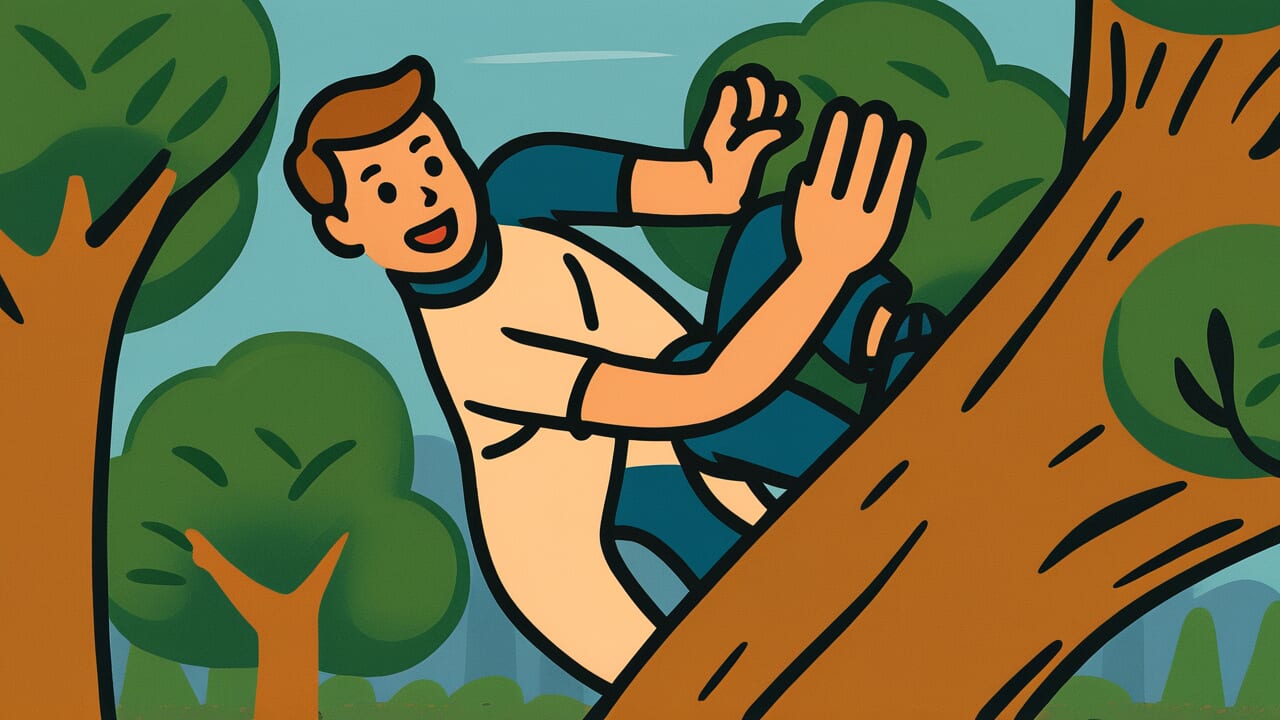How to Read “Climbing a hundred-foot tree and falling from a ten-foot branch”
Hyakujō no ki ni nobotte ichijō no eda yori otsuru
Meaning of “Climbing a hundred-foot tree and falling from a ten-foot branch”
This proverb means that the higher your position, the greater your loss when you fail.
If you fall from a hundred-foot height on a tree, you’ll suffer far more damage than falling from near the ground. Similarly, when someone in a high social position makes a mistake or fails, the impact and damage become immeasurable.
This proverb serves as a warning to successful people and those in power. The higher your position, the more one judgment error or moment of carelessness affects not just yourself but many people around you.
Also, people in high positions have more eyes watching them. When they fall, their loss of honor and trust becomes much greater.
Even today, we can understand this proverb’s meaning when corporate leaders, politicians, or celebrities cause scandals.
Origin and Etymology
No clear written records exist about this proverb’s origin. However, we can make interesting observations from how the phrase is constructed.
First, notice the contrast between “hundred feet” and “ten feet.” One jō equals about 3 meters, so a hundred jō is an incredible 300 meters high.
Whether such tall trees actually exist doesn’t matter. The extreme numbers reveal the proverb’s essence.
Someone climbs all the way to a hundred feet, then somehow falls at the last ten feet. This expression symbolically depicts how people fall from great heights through a tiny moment of carelessness after long effort.
Ancient Chinese philosophy includes the idea that “climbing high inevitably brings danger.” This proverb likely reflects such Eastern thought.
It expresses a life truth through the concrete image of tree climbing. The higher your position or success, the harder you fall and the more you lose.
Similar expressions appear in Edo period moral instruction books. This suggests the proverb spread as a warning to people with social status, like samurai and merchants.
Usage Examples
- That company president reached the top of the industry, but lost everything through one act of fraud. It’s truly “Climbing a hundred-foot tree and falling from a ten-foot branch”
- Even with years of achievement as a politician, one final careless remark forced him into retirement. That’s “Climbing a hundred-foot tree and falling from a ten-foot branch”
Universal Wisdom
This proverb has been passed down because it perfectly captures the cruel asymmetry between success and downfall in human society.
We work hard to reach great heights. We climb step by step, taking our time. But the fall happens in an instant.
Even if climbing a hundred feet takes years, falling takes only a moment. This merciless imbalance reveals life’s harshness.
Looking deeper, this proverb hints at the loneliness and pressure of high positions. The higher you climb, the fewer branches support you, and the stronger the wind blows.
Near the top, each decision carries serious consequences. The room for acceptable mistakes shrinks.
Humans are creatures who seek success. But we face a contradiction: the more we succeed, the more we have to lose.
This proverb teaches us to balance ambition with caution, and aspiration with humility. Aiming high is wonderful, but you must constantly check your footing while you’re up there.
Our ancestors condensed this essential truth about human society into a simple image of climbing a tree.
When AI Hears This
The human brain recognizes progress as “percent remaining.” At 90 percent completion, dopamine floods the reward system.
Your brain starts celebrating “success” before you’ve actually finished. When this combines with normalcy bias, danger follows.
Aviation accident analysis shows 52 percent of all accidents happen in the final minutes before landing. Pilots fly perfectly for hours, then their attention slips the moment they see the runway.
Even more interesting: human cognitive resources are limited. After prolonged concentration, the prefrontal cortex depletes its glucose supply and judgment deteriorates.
Climbing a hundred feet requires enormous energy. At ninety feet, you might have physical stamina left, but your brain’s decision-making function is already exhausted.
Medical settings show statistically more suturing errors in surgery’s final stages. The cause isn’t the surgeon’s skill but cognitive fatigue.
This proverb is sharp because it expresses both physical height and psychological carelessness simultaneously. Humans overestimate themselves, thinking “I made it this far.”
We tend to rate our success probability 20 to 30 percent higher than reality. The moment you see the goal is actually the most dangerous time from a neuroscience perspective.
Lessons for Today
This proverb teaches us that how you handle success matters as much as the journey to get there.
When you build your career and reach a position of responsibility, you must not forget humility. The higher your position, the more weight each word and action carries.
A casual comment on social media, a small judgment error, carelessness born from complacency—these can lead to irreversible consequences.
However, this proverb doesn’t say “don’t aim high.” Rather, it delivers a positive message: “If you aim high, prepare yourself and commit to staying there.”
What matters is developing the habit of checking your footing as you climb the ladder of success. Never forget gratitude to those around you, and cherish relationships with people who support you.
Most importantly, no matter how high you stand, never lose your attitude of continuous learning and growth.
Whatever position you’re in now, if you keep this wisdom in your heart, you can surely achieve long-lasting, stable success.



Comments